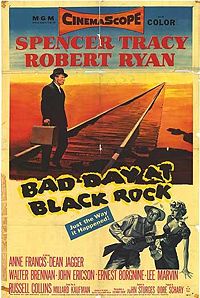 Today I plucked Emma Lathen‘s Death Shall Overcome from my recently reconstituted bookshelves. It was published in 1966, and it’s one of a series of mysteries featuring the improbable but highly likable and, in the clinches, deeply honorable amateur sleuth John Putnam Thatcher, who in his day job is senior vice president of the Sloan Guaranty Trust, a staid and sober Wall Street institution that would never, or at least not in 1966, find itself in the untoward position of requiring a financial bailout from these reluctantly wallet-emptying United States of America. The Sloan Guaranty found ways to act justly and properly and still pile up princely profits, which perhaps is a tipoff that this is a work of fiction.
Today I plucked Emma Lathen‘s Death Shall Overcome from my recently reconstituted bookshelves. It was published in 1966, and it’s one of a series of mysteries featuring the improbable but highly likable and, in the clinches, deeply honorable amateur sleuth John Putnam Thatcher, who in his day job is senior vice president of the Sloan Guaranty Trust, a staid and sober Wall Street institution that would never, or at least not in 1966, find itself in the untoward position of requiring a financial bailout from these reluctantly wallet-emptying United States of America. The Sloan Guaranty found ways to act justly and properly and still pile up princely profits, which perhaps is a tipoff that this is a work of fiction.
Death Shall Overcome hinges on the impending appointment to a seat on the New York Stock Exchange of its first black member, a man of impeccably conservative fiduciary credentials and precisely the pigmentation to drive certain portions of The Club straight up the wall. Not John Putnam Thatcher, of course, who knows a good man — and a proper course of action — when he sees one.
Mystery monger Jim Huang considers Lathen’s skills as a sly and pointed observer of the social customs of the actual and would-be cultural elite to be Jane Austen-like. That may be taking things a little far, and yet three-fourths of the pleasure in reading these witty mysteries comes from Lathen’s wry observations of the peculiar culture that is her milieu. So, borrowing a page once again from Rose City Reader (I know, I said I’d do this only once — I lied) here’s the beginning of the book:
Above all, Wall Street is power. The talk is of stocks and bonds, of contracts and bills of lading, of gold certificates and wheat futures, but it is talk that sends fleets steaming to distant oceans, that determines the fate of new African governments, that closes mining camps in the Chibougamou. In the world’s great money market, power has forged massive canyons through which thousands of men and women daily hurry to work, hurry to lunch, hurry, hurry, hurry in the shadows of towers tall enough to defy the heavens. Depending upon your point of view, Wall Street is either awesomely impressive or appalling.
No one has ever called it beautiful.
If I thought the John Thatcher Putnams were in charge, I’d vote for “awesomely impressive.” Lacking that assurance … well, there’s always fiction. And Emma Lathen is really very good at it.
 Our partner-in-Scattering Barry Johnson (who does not look like the portrait here of Tom Paine, rabble-rousing author of the political tract Common Sense) advocates a little citywide common sense in the continuing flap over Portland’s Rose Quarter and Mayor Sam Adams’ push to tear down Memorial Coliseum to make room for a minor-league baseball park and a suburban-style “entertainment district” of aggressively anonymous chain outfits on the order of a Hard Rock Cafe.
Our partner-in-Scattering Barry Johnson (who does not look like the portrait here of Tom Paine, rabble-rousing author of the political tract Common Sense) advocates a little citywide common sense in the continuing flap over Portland’s Rose Quarter and Mayor Sam Adams’ push to tear down Memorial Coliseum to make room for a minor-league baseball park and a suburban-style “entertainment district” of aggressively anonymous chain outfits on the order of a Hard Rock Cafe.
 Then, beginning Monday, it will be incumbent on me (an odd turn of phrase, but there you have it) to introduce her to my wandering route of coffee houses, especially those with free wireless connections. Who says you can’t work and drink at the same time?
Then, beginning Monday, it will be incumbent on me (an odd turn of phrase, but there you have it) to introduce her to my wandering route of coffee houses, especially those with free wireless connections. Who says you can’t work and drink at the same time?
 As anthologies go, the monstrous Poems for the Millennium, Volume Three: The University of California Book of Romantic and Postromantic Poetry (2009), edited by Jerome Rothenberg and Jeffrey Robinson, is a Hummer pretending to be a hybrid. Combined with its sturdy predecessors, Poems for the Millennium: The University of California Book of Modern and Postmodern Poetry, Volume One: From Fin-de-Siecle to Negritude (1996), and Volume Two: From Postwar to Millennium (1998), edited by Rothenberg and Pierre Joris, with 2600 combined pages, they are a fully-loaded triple trailer.
As anthologies go, the monstrous Poems for the Millennium, Volume Three: The University of California Book of Romantic and Postromantic Poetry (2009), edited by Jerome Rothenberg and Jeffrey Robinson, is a Hummer pretending to be a hybrid. Combined with its sturdy predecessors, Poems for the Millennium: The University of California Book of Modern and Postmodern Poetry, Volume One: From Fin-de-Siecle to Negritude (1996), and Volume Two: From Postwar to Millennium (1998), edited by Rothenberg and Pierre Joris, with 2600 combined pages, they are a fully-loaded triple trailer. It’s a great idea, and it’s hers, and no way am I going to steal it, because that would be so wrong. But just this once I’m going to borrow it, because after putting new shelves in the office I’ve been restocking some books that have been sitting in boxes in the basement, and that includes pretty much my entire collection of mysteries, which I’ve now been taking out selectively and re-reading with pleasure.
It’s a great idea, and it’s hers, and no way am I going to steal it, because that would be so wrong. But just this once I’m going to borrow it, because after putting new shelves in the office I’ve been restocking some books that have been sitting in boxes in the basement, and that includes pretty much my entire collection of mysteries, which I’ve now been taking out selectively and re-reading with pleasure. Today, as much of the world is eager to tell you, is William Shakespeare’s 445th birthday. The Bard of Avon, the Sultan of Stagecraft, the Titan of Tragedy, the Crown Prince of Comedy was born beneath a twinkling star on this day, April 23, in the Year of Our Lord 1564, whereupon he was wrapped in swaddling clothes and laid in a manger, and …
Today, as much of the world is eager to tell you, is William Shakespeare’s 445th birthday. The Bard of Avon, the Sultan of Stagecraft, the Titan of Tragedy, the Crown Prince of Comedy was born beneath a twinkling star on this day, April 23, in the Year of Our Lord 1564, whereupon he was wrapped in swaddling clothes and laid in a manger, and … All right, so I’m jumping to conclusions based on the thinnest of evidence. Which is pretty much, we here at Art Scatter tend to believe, exactly what the anti-Stratfordians have been doing all these years. The most rational response to this whole dust-up, we tend to believe, is that the guy whose name is on the cover actually wrote the stuff inside. But we also tend to think that, unless you own stock in downtown Stratford-Upon-Avon, which has a huge vested interest in the local boy actually being who he said he was, it doesn’t make a lot of difference. The play’s the thing. And the plays aren’t going away. (As a side note, Art Scatter would like to declare that we approve mightily of the historical existence of a character named Vicar Bretchgirdle. Did the good vicar know Sir Toby Belch?)
All right, so I’m jumping to conclusions based on the thinnest of evidence. Which is pretty much, we here at Art Scatter tend to believe, exactly what the anti-Stratfordians have been doing all these years. The most rational response to this whole dust-up, we tend to believe, is that the guy whose name is on the cover actually wrote the stuff inside. But we also tend to think that, unless you own stock in downtown Stratford-Upon-Avon, which has a huge vested interest in the local boy actually being who he said he was, it doesn’t make a lot of difference. The play’s the thing. And the plays aren’t going away. (As a side note, Art Scatter would like to declare that we approve mightily of the historical existence of a character named Vicar Bretchgirdle. Did the good vicar know Sir Toby Belch?)
 Yes, charmed. And I thought, this is policymaking outside the channels of policy. Here, in Obama, is a man utterly at ease inside his own skin. That’s why people respond to him. Because he’s comfortable with himself.
Yes, charmed. And I thought, this is policymaking outside the channels of policy. Here, in Obama, is a man utterly at ease inside his own skin. That’s why people respond to him. Because he’s comfortable with himself.
 Stop me if you’ve heard this one before. There are two plots, it is said: Someone Goes On A Trip and Stranger Comes To Town. That’s one plot, actually, with two points of view. Stranger must go on trip from some other town in order to come to ours.
Stop me if you’ve heard this one before. There are two plots, it is said: Someone Goes On A Trip and Stranger Comes To Town. That’s one plot, actually, with two points of view. Stranger must go on trip from some other town in order to come to ours.